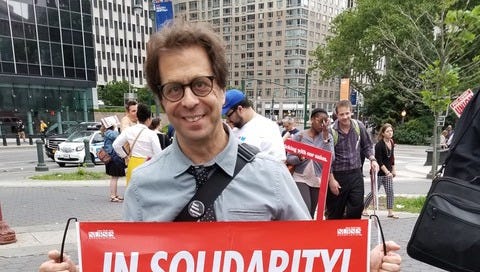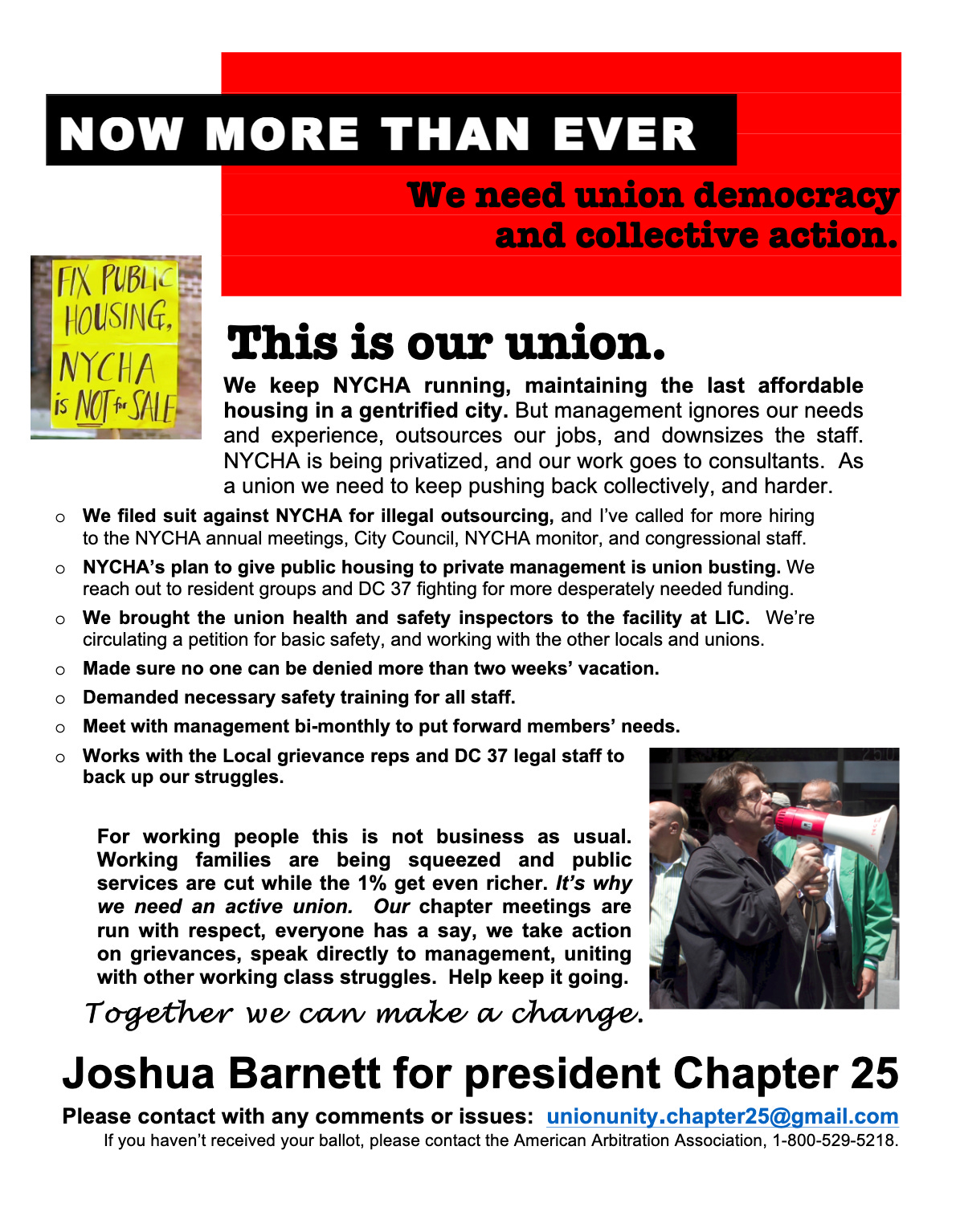As President of Local 375’s Chapter 25 (NYCHA, or the New York City Housing Authority), Josh Barnett has spent decades fighting for public housing residents, union members, New Yorkers and workers around the world. Since 1999, Barnett has worked at NYCHA, where he works on architecture projects within NYCHA’s housing developments serving working-class communities. “I’m an architect, and I work in public housing—that’s what keeps me going,” Barnett shares, adding that his mission is rooted in his family’s working-class, union-strong background.
Growing up in Brooklyn as a third-generation New Yorker, Barnett learned the value of union work firsthand. His mother was a secretary, his father a printer, and his grandfather a cab driver—all union members. “I was influenced early by that union spirit,” he says. “My parents were real radicals, and that sense of advocacy has always stayed with me.” With this drive, he became the first in his family to attend college, with a vision to give back to the community. “Becoming an architect allowed me to do that. I wanted to design spaces that provided shelter and dignity for those who needed it most.”
After a stint working construction and in the private sector, Josh entered the public sector with Boston’s public housing authority, where he was fired for trying to unionize the agency’s architects. After, Barnett joined NYCHA and began his journey with Local 375. He quickly became a delegate, where he saw the need for a more engaged and politically active union. “The chapter back then was focused on ‘business unionism,’ but I wanted it to be more than that,” Barnett explains. After serving as the Local’s Civil Service chair beginning in 2006, this vision led him to run for Chapter President in 2010, a role he has held for three terms. Josh uses this role as a platform to address systemic issues and advocate for his members.
One of the greatest challenges, Barnett notes, is the steady defunding of public housing. “Developers run this city, and public housing pays the price. Every dollar that goes to high-end luxury development could make a huge difference in public housing,” he argues. Josh has pushed to oppose develop-led politics, especially the privatization of public housing, through his work with the Architecture Lobby and the union, attempting to build solidarity between workers, public housing residents, and the community at large.
This lack of funding also affects staffing. When he began his career, NYCHA had about 16,000 workers. Today, it’s down to less than 12,000, and his chapter has also seen a sharp drop in technical staff. “It’s tough,” he admits. “Public housing is under-resourced and often politically unpopular, but the needs are greater than ever.” Another reason for NYCHA’s staff reduction is outsourcing. "Outsourcing and privatization are big challenges. We’re seeing consultants do the same work as union members, which not only diminishes our role but is a civil service violation,” he explains. "But getting DC 37 to stand up against these violations is another struggle."
Despite the hurdles, Barnett finds pride in Chapter 25’s achievements. His chapter meetings draw a strong turnout—nearly a third of members attend regularly, a stark contrast to many union chapters. "People want to come to our meetings because they’re productive spaces for exchanging ideas and raising issues,” Josh says. “We even get members from other locals, which builds unity on the shop floor.” For him, building alliances across the workforce and with other unions at the Housing Authority, including Teamsters who maintain the grounds, is essential to combating the challenges posed by privatization and lack of worker empowerment. "We’re stronger together, and that’s something I really focus on.”
Josh’s term has also seen some notable victories, including a recent win on remote work and safety. After a two-and-a-half-year push, Chapter 25 finally managed to secure remote work agreements, adding two remote days for employees. Another small but symbolic win came when Josh’s chapter successfully lobbied the city to install a stop sign near NYCHA’s Long Island City office, an area he describes as “an abandoned warehouse district, where safety was a real concern.” Although NYCHA initially opposed this request, the union’s persistence led to success. “It’s a small thing, but it restored some faith in our union. NYCHA might have told us, ‘nobody is forcing you to work here,’ but we showed that with collective action, we can make changes.”
Josh believes that for unions to fully serve their members, they need to unite across unions and uinion locals. He points to DC 37's pattern bargaining—where they negotiate first, setting the tone for other unions—as something that, if changed, could amplify unions collective power. "If unions fought in solidarity [by bargaining together]. it would be a real force," Josh says, adding that broader, community-focused bargaining can push unions to take on important issues like budget cuts, housing and climate change."Unions should be bargaining for the common good, just like the Chicago Teachers’ Union, which advocates for housing alongside education.”
Another political, common-good issue Barnett pushes the union to fight for is an anti-war movement. Josh has joined organizing efforts calling for unions to support a ceasefire in Palestine and a US embargo on arms to Israel, arguing that military spending should be redirected to fund public resources like libraries and housing. “All these fights are connected,” he says, emphasizing that rank-and-file members understand this even if union leadership has yet to follow.
However, DC 37 and it’s parent union AFSCME have not taken a consistently anti-war position. Reflecting on his experiences at the 2005 AFSCME convention, Josh notes the union’s reluctance to engage with broader political issues, particularly those that diverge from the Democratic Party line. Despite five locals proposing resolutions to oppose the Iraq War, none made it to the floor. "It’s frustrating to see a union as strong as AFSCME sideline issues that matter to working people because of party politics," he says. For Josh, this reluctance reflects a larger trend: union leadership has moved away from the language of class struggle, choosing terms like "saving the middle class" instead of championing the working class. "I’m a worker—a white-collar worker—and there’s no shame in that,” Josh insists. He calls for a return to the labor movement’s roots, where unions unapologetically represented the working class.
As Josh nears the end of his term, he’s dedicated to developing a new generation of activists who will continue the fight. “We need fresh faces and new ideas,” he says. “No one should be in a leadership role forever—it’s time to pass the torch.” In his time with the union, he has noticed DC 37 lose even more of it’s “activist outlook” since he initially became a member. DC 37 used to have big rallies during contract negotiations, which has basically ended in recent years, leaving members on the outside looking in. Accordingly, his advice to new union members is simple yet powerful: “We are the union, not just the leadership. If something’s affecting you, it’s likely affecting others too. Get involved, stay informed, and know that you can make a difference.” It may not be easy to plug in, but that didn’t stop Josh: he had to look up DC 37 in the Yellow Pages to become a member!
For Josh Barnett, his work at NYCHA and in the union (and with the Architecture Lobby!) is more than just a career; it’s a lifelong commitment to public service and social justice. His life and career is an inspiration to us all. Thanks for everything you do, Josh!







